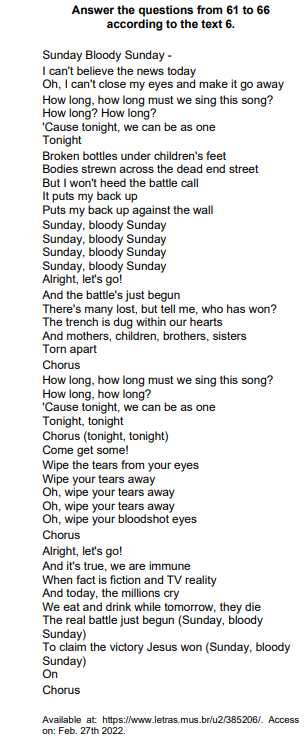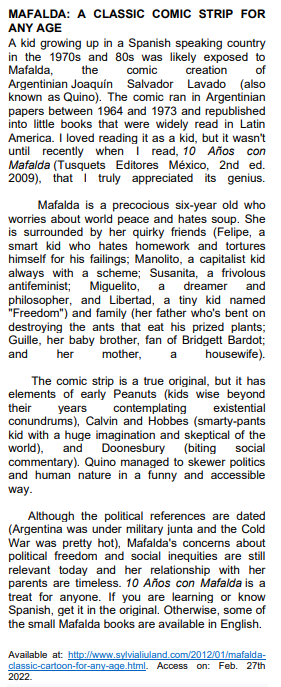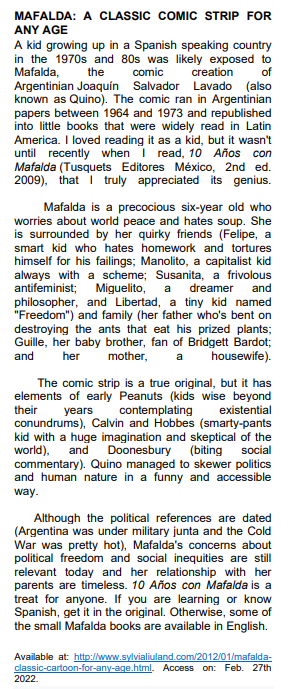O que espanta os primeiros físicos ou filósofos, o que lhes causa admiração e melancolia é a perpétua instabilidade das coisas, sua aparição e desaparição, o nascimento e a morte, a geração e a corrupção dos seres. Em uma palavra,
Como é frequente nos estudos teóricos e na história da filosofia, a cada época surge um novo Platão, ou um Platão diferente dos anteriores. Sobre o tema, analise as assertivas e assinale a alternativa que aponta as corretas.
I. O Platão de Aristóteles é o filósofo preocupado com a distinção entre o mundo sensível das aparências e o mundo inteligível das essências, com o ser e o não ser e com as questões lógicas do conhecimento.
II. O Platão interpretado por Plotino é o filósofo preocupado com a teologia: o Bem (a ideia suprema, para Platão) é o ser uno e indizível, luz infinita, impensável e inalcançável pelo espírito comum, espalhando-se em emanações que formam o mundo, indo desde as formas puramente espirituais e imateriais até a matéria bruta, treva pura.
III. O Platão dos primeiros cristãos é o Platão da imortalidade da alma, da crítica ao corpo como prisão da alma, da purificação espiritual como forma de salvação.
IV. Para Nietzsche, “Platão, esta flor mais bela da Grécia”, foi destruído pelo racionalismo ressequido de Sócrates, que lhe tirou a energia agonística para transformá-lo no metafísico das ideias
Epicteto e Marco Aurélio são nomes associados a qual corrente filosófica?
Dentre as contribuições de Francis Bacon, está sua teoria dos ídolos, cuja primeira função é a de tornar os homens conscientes das falsas noções que obscurecem sua mente e barram o caminho para a verdade. Sobre o tema, assinale a alternativa correta.
Sobre a Base Nacional Comum Curricular (BNCC) e o futuro da filosofia no Ensino Médio, analise as assertivas a seguir e assinale a alternativa que aponta as corretas.
I. A BNCC não exclui a filosofia nem dá diretrizes rígidas para sua configuração no Ensino Médio. O fato de a filosofia ter deixado de ser disciplina obrigatória não significa que ela tenha saído do currículo nem que precise sair.
II. A permanência da filosofia como unidade curricular dependerá do MEC e das secretarias estaduais de educação, por meio da elaboração dos projetos pedagógicos e da organização de campanhas de conscientização dos professores e diretores escolares.
III. A BNCC, sem anular o modelo clássico da formação por aulas, oferece outros modelos formativos (laboratórios, oficinas etc.), válidos para todas as unidades curriculares. Nisso há uma possibilidade forte de encontrar itinerários formativos em filosofia.
Para este importante filósofo do século XX, a tarefa da filosofia seria a de usar adequadamente a linguagem, conhecendo seus limites e calando-se diante do que não pode ser falado. A qual filósofo o enunciado se refere?
Assinale a alternativa que apresenta corretamente uma das principais características do fenômeno que ficou conhecido como indústria cultural, termo difundido pelos filósofos Theodor Adorno e Max Horkheimer.
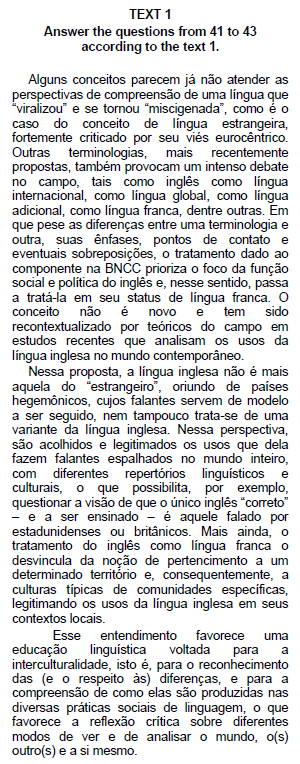
Brasil. Ministério da Educação. Base Nacional Comum Curricular. 2017. Adaptado.
The third paragraph
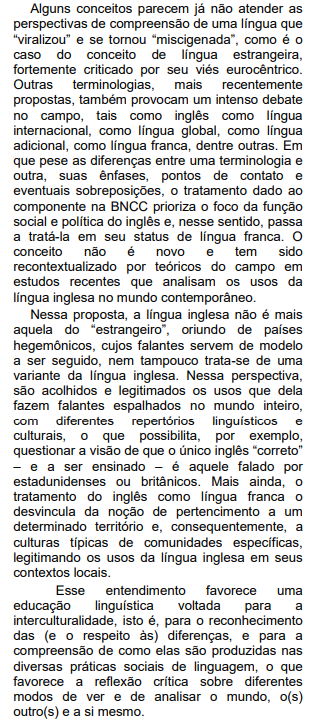
Brasil. Ministério da Educação. Base Nacional Comum Curricular. 2017. Adaptado.
According to the second paragraph and to your previous knowledge about the topic, consider the statements:
I. Teaching is an interactive and non-negotiable process.
II. The assessment is important because it provides information that supports decisions to be made regarding content, methods and objectives.
III. The assessment must be continuous and systematic.
IV. The assessment must offer a quantitative view of the knowledge built.
The correct statements are found in:
TEXT 5 Answer the questions from 54 to 60 according to the text 5.
Ukraine-Russia War: Impact on Gas, Stocks, Inflation and the US Economy
Stock prices rebounded Friday, but the invasion of Ukraine could bring about many disruptions to the US economy.
Russia's invasion of Ukraine intensified on Saturday as troops continued to march on the capital Kyiv, which has instituted a citywide curfew from 5 p.m. local time Saturday until 8 a.m. Monday. US defense officials report that Russian troops launched more than 250 missiles at Ukraine Saturday but have been slow to advance on Kyiv, per ABC News. The attacks have virtually shut down shipping in Ukraine, a country with massive agricultural production, particularly corn and wheat. Russia and Ukraine are also major suppliers of metals and other industrial commodities, while Russia is one of the world's largest oil and gas producers. The invasion not only has ramifications for political stability in Europe and around the world, it's also straining a global economy already weakened by inflation, rising energy prices, the ongoing COVID-19 pandemic and a constrained supply chain. Here's how Russia's attacks on Ukraine, and the resulting economic sanctions from the West, are affecting Americans and people around the world.
Gas and oil prices on the rise
Russia's invasion of Ukraine has caused global energy prices to spike, with crude oil rising Thursday above $105 a barrel for the first time since 2014. The price cooled down a bit later on Thursday and Friday, and currently sits around $92.50 a barrel, according to OilPrice.com. Per AARP, the average price of gas in the US on Saturday was $3.60 a gallon, up slightly from $3.57 on Friday. Russia is one of the world's largest producers of crude oil and natural gas, providing roughly 40% of the European Union's gas. Sanctions from the West could affect access to that supply, especially with Germany putting a halt to the Nord Stream 2 pipeline that was intended to bring natural gas from Russia to the EU via the Baltic Sea.
Continued inflation
Russia is the largest exporter and second-largest producer of palladium, a metal used in mobile phones, automotive exhaust systems, fuel cells and even jewelry and dental fillings. Rising prices of palladium and other essential metals could lead to price increases for manufacturers and, ultimately, consumers. "We could see a new burst of inflation," the American Enterprise Institute's Christopher Miller told The New York Times.
[...]
More cyberattacks
The US Departments of Treasury and Homeland Security have both sounded the alarm over possible cyberattacks on US banks, hospitals, government offices and power grids in retaliation for sanctions against Moscow. On Thursday morning local time, websites for the Ukrainian cabinet and foreign affairs and education ministries were all experiencing disruptions. Herbert Lin, senior research scholar at Stanford's Center for International Security and Cooperation, told the Atlantic's Rachel Gutman that the Russians have elevated cyberattacks to an "art form." Though US banks have been heightening their defenses, Lin added, utilities in larger cities might be more at risk because they lack the extra funding for cybersecurity. Lin discouraged a panicked response by everyday Americans but said having extra cash and a go bag might not be a bad idea. He underscored that those items should always be in place regardless.
Rising food prices
Food prices have already gone up in the US and abroad, and the dent in wallets could get bigger with the Russian invasion. Ukraine is one of the top five corn exporters in the world, trading some 35.9 million metric tons in 2019 alone. An extended open conflict would likely see prices go up in Europe, not just for corn itself but also for related goods, including cooking oil, corn syrup and livestock feed. Soybean prices have also surged in the US in recent months, following an unusually poor crop in South America.
If US farmers have to make up the difference in both corn and soybeans, which compete for land, prices for both crops will likely rise in the United States, as will the cost of packaged goods made with them. Russia is the world's largest exporter of wheat, a crop that Ukraine exports as well, commodities economist Arlan Suderman told MarketWatch. Together the two nations account for nearly a third (29%) of the global wheat trade. "A prolonged military conflict that disrupts trade could make much of that wheat unavailable to the export market," Suderman said. The US doesn't rely on Russian wheat -- Egypt, Turkey and Bangladesh are the biggest importers -- but the trade disruption could affect global prices on flour, pasta, bread, pizza and other wheat products. On the Chicago Board of Trade, wheat futures jumped by as much as 5.7% on Thursday, to just over $9.34 a bushel, the highest price since 2012. Soybean prices also leaped to a nine-year high, while corn climbed to an eight-month peak. Rates on all three futures have started to contract, with overnight losses of between 2% and 3%.
Available at: https://www.cnet.com/how-to/ukraine-russia-war-impact-on-gas-stocks-inflation-and-the-us-economy/. Access on: Feb. 27th 2022 (adapted).
According to the text, it is correct to say:
TEXT 5 Answer the questions from 54 to 60 according to the text 5.
Ukraine-Russia War: Impact on Gas, Stocks, Inflation and the US Economy
Stock prices rebounded Friday, but the invasion of Ukraine could bring about many disruptions to the US economy.
Russia's invasion of Ukraine intensified on Saturday as troops continued to march on the capital Kyiv, which has instituted a citywide curfew from 5 p.m. local time Saturday until 8 a.m. Monday. US defense officials report that Russian troops launched more than 250 missiles at Ukraine Saturday but have been slow to advance on Kyiv, per ABC News. The attacks have virtually shut down shipping in Ukraine, a country with massive agricultural production, particularly corn and wheat. Russia and Ukraine are also major suppliers of metals and other industrial commodities, while Russia is one of the world's largest oil and gas producers. The invasion not only has ramifications for political stability in Europe and around the world, it's also straining a global economy already weakened by inflation, rising energy prices, the ongoing COVID-19 pandemic and a constrained supply chain. Here's how Russia's attacks on Ukraine, and the resulting economic sanctions from the West, are affecting Americans and people around the world.
Gas and oil prices on the rise
Russia's invasion of Ukraine has caused global energy prices to spike, with crude oil rising Thursday above $105 a barrel for the first time since 2014. The price cooled down a bit later on Thursday and Friday, and currently sits around $92.50 a barrel, according to OilPrice.com. Per AARP, the average price of gas in the US on Saturday was $3.60 a gallon, up slightly from $3.57 on Friday. Russia is one of the world's largest producers of crude oil and natural gas, providing roughly 40% of the European Union's gas. Sanctions from the West could affect access to that supply, especially with Germany putting a halt to the Nord Stream 2 pipeline that was intended to bring natural gas from Russia to the EU via the Baltic Sea.
Continued inflation
Russia is the largest exporter and second-largest producer of palladium, a metal used in mobile phones, automotive exhaust systems, fuel cells and even jewelry and dental fillings. Rising prices of palladium and other essential metals could lead to price increases for manufacturers and, ultimately, consumers. "We could see a new burst of inflation," the American Enterprise Institute's Christopher Miller told The New York Times.
[...]
More cyberattacks
The US Departments of Treasury and Homeland Security have both sounded the alarm over possible cyberattacks on US banks, hospitals, government offices and power grids in retaliation for sanctions against Moscow. On Thursday morning local time, websites for the Ukrainian cabinet and foreign affairs and education ministries were all experiencing disruptions. Herbert Lin, senior research scholar at Stanford's Center for International Security and Cooperation, told the Atlantic's Rachel Gutman that the Russians have elevated cyberattacks to an "art form." Though US banks have been heightening their defenses, Lin added, utilities in larger cities might be more at risk because they lack the extra funding for cybersecurity. Lin discouraged a panicked response by everyday Americans but said having extra cash and a go bag might not be a bad idea. He underscored that those items should always be in place regardless.
Rising food prices
Food prices have already gone up in the US and abroad, and the dent in wallets could get bigger with the Russian invasion. Ukraine is one of the top five corn exporters in the world, trading some 35.9 million metric tons in 2019 alone. An extended open conflict would likely see prices go up in Europe, not just for corn itself but also for related goods, including cooking oil, corn syrup and livestock feed. Soybean prices have also surged in the US in recent months, following an unusually poor crop in South America.
If US farmers have to make up the difference in both corn and soybeans, which compete for land, prices for both crops will likely rise in the United States, as will the cost of packaged goods made with them. Russia is the world's largest exporter of wheat, a crop that Ukraine exports as well, commodities economist Arlan Suderman told MarketWatch. Together the two nations account for nearly a third (29%) of the global wheat trade. "A prolonged military conflict that disrupts trade could make much of that wheat unavailable to the export market," Suderman said. The US doesn't rely on Russian wheat -- Egypt, Turkey and Bangladesh are the biggest importers -- but the trade disruption could affect global prices on flour, pasta, bread, pizza and other wheat products. On the Chicago Board of Trade, wheat futures jumped by as much as 5.7% on Thursday, to just over $9.34 a bushel, the highest price since 2012. Soybean prices also leaped to a nine-year high, while corn climbed to an eight-month peak. Rates on all three futures have started to contract, with overnight losses of between 2% and 3%.
Available at: https://www.cnet.com/how-to/ukraine-russia-war-impact-on-gas-stocks-inflation-and-the-us-economy/. Access on: Feb. 27th 2022 (adapted).
In “Together the two nations account for nearly a third (29%) of the global wheat trade”, the underlined term, in the text, corresponds to:
In “Broken bottles under children's feet Bodies strewn across the dead end street But I won't heed the battle call It puts my back up Puts my back up against the wall”, it is correct to infer:
Regarding the title “Anyone Can Teach?” and its grammatical structure, it is correct to say:
According to the text, what could be onsidered as the central theme of Mafalda´s comic trips?
Read the following excerpt: “The comic ran in Argentinian papers between 1964 and 1973 and republished into little books that were widely read in Latin America. I loved reading it as a kid, but it wasn't until recently when I read, 10 Años con Mafalda (Tusquets Editores México, 2nd ed. 2009), that I truly appreciated its genius”. Respectively, the underlined words are:

